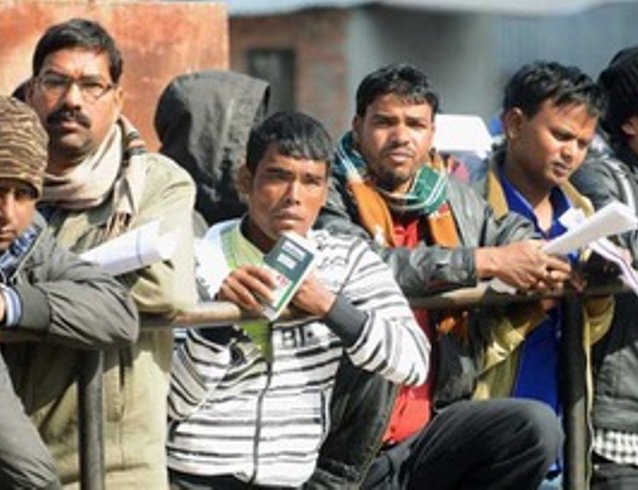
From Kathmandu and across the border points, there was a rush of people to go back home. Many migrant workers who were working in India created a long jam near the border. Similarly, migrant workers who were in Kathmandu also wanted to rush back home.
The situation developed as a major human crisis in Nepal. There was a hush and yet a rush as if something ominous was going to happen. On March 23, the prime minister announced the weeks of lockdown to prevent the spread of coronavirus.
The rush of people was understandable. For Nepal's migrant and daily wage workers, lockdown is more dangerous than the coronavirus. Although Nepal is able to manage the migrants internally, it is facing an enormous challenge in trying to arrange the safe return and protection of thousands of Nepalese migrant workers who are stranded in the border areas between Nepal and India, and in other parts of the world.
As the country has announced a lockdown of public spaces, transportation services and airports and the borders with India and China have been completely sealed. Nepal’s new challenge is much bigger.
Travel into and out of the country, including that of Nepali citizens, is restricted. The lockdown has not impacted everyone in the same way, and migrant workers and daily wage labourers are among the hardest hit by the restrictions.
The influx of Nepali migrant workers from Nepal and India shows the coming challenges for the country.
In the past few decades, many Nepalis had travelled to countries like Saudi Arabia, Kuwait, Malaysia, South Korea and neighbouring India to find work. Close to one-third of Nepal's economy is supported by the remittances sent home by these workers. The government has initiated a process to track down the estimated 4.5 million Nepalis currently living overseas as migrant workers.
Nearly 5000 Nepalese migrant workers are stuck at Nepal-India border, desperate to get back home, as they have no shelter or food. Many of them are sleeping on the street and some are risking their lives to cross the border illegally.
Nepali migrant laborers living in countries such as the United Arab Emirates also find themselves at a considerable risk. Amidst the pandemic and lockdown, Qatar has suddenly deported hundreds of Nepalis without any backup support, while thousands of workers are still living in the camps of Qatar without jobs and proper shelter.
The human rights advocacy group has accused the Qatari authorities of rounding and expelling dozens of migrant workers after telling them that they were being taken to be tested for Covid-19 in March.
In addition, more than 655 COVID-19 cases have been found among Nepalis overseas migrant workers. Many migrant laborers are seeking the government’s support to return home, but the government of Nepal is neither willing nor ready to facilitate their safe return.
As the lockdown started to work, thousands of people, including stranded students and jobless day-laborers, have been returning to their villages from big cities like Kathmandu, Pokhara and Chitwan.
Many domestic migrant workers were faced with a dilemma as transportation services were shut down, making it difficult for them to return to their home districts. Many started making the journey on foot.
“We have no jobs since the lockdown began, and its extending every week. We are staying at home, running out of food and money. We don’t have any other friends or support systems like in the village. The situation is very uncertain and it’s difficult for us to survive in Kathmandu. Therefore, we are obliged to walk home on foot even though the journey is long and difficult. We are in a group of 10 friends going in the same direction. It will take at least 4 days to reach home. But we will slowly make our way home because there’s no option left for us.
On April 17, 2020, the Supreme Court of Nepal passed an order mandating the government to repatriate vulnerable migrant workers abroad and to arrange free transportation for all citizens heading home to ensure they travelled safely. The order included a requirement that people suspected of having COVID-19 be quarantined before they are sent home.
It may be too soon to determine and how efficiently the government implements these mandates, given the country is under lockdown.
According to the statistics, since the first case of COVID-19 was detected on January 24 Nepal has had only few confirmed cases and recoveries at the time of writing this.
While the number of cases reported inside Nepal is relatively small, there is still fear of an outbreak as there are concerns that the testing taking place in the country is insufficient.
Nepal government is focusing primarily on immediate health needs, but in order to save the country from a larger socio-economic crisis, it should also address the issues of vulnerable citizens. The government should also be preparing long-term strategies in consultation with experts for how the country can be released from the current lockdown.
- TANAHU HYDROPOWER PROEJCT: A Significant Achievement
- Apr 15, 2024
- AMBASSADOR HANAN GODAR: Sharing Pain With A Nepali Family
- Mar 30, 2024
- VISIT OF KfW AND EIB TO NEPAL : Mission Matters
- Mar 25, 2024
- NEPAL BRITAIN SOCIETY: Pratima Pande's Leadership
- Mar 24, 2024
- NEPAL ARMY DAY: Time To Recall Glory
- Mar 15, 2024
















